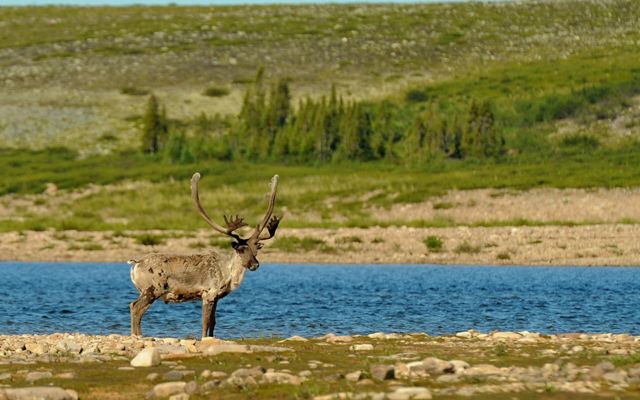
With 80% of the Province covered by boreal forest, Manitoba provides incredible opportunities to partner with Indigenous communities on protecting this landscape.
The boreal forest is the Earth's largest terrestrial carbon sink, storing 208 billion tons of carbon, or the equivalent to 26 years of global carbon emissions. The Nature Conservancy’s project is located in one of the most intact areas.
Working with Indigenous Peoples
We strive to develop meaningful partnerships with First Nations communities that create a dialogue of trust and respect for Indigenous rights and cultural traditions. Learn more about our approach in Canada.
Results here will carry global significance. The ideas and approaches that are developed can inform forest conservation around the world—contributing to new ways of partnering with Indigenous peoples and implementing creative market and policy solutions.
Home to ten of Canada’s last and largest woodland caribou herds, this region is filled with mossy peatlands and unbroken stretches of forest, which are key to supporting healthy ecosystems and native plant and animal species.
For thousands of years, First Nations communities thrived within the richness and sustenance of the Boreal as the land’s original stewards. But as demand for resources grew, their authority over their traditional territories was challenged, their economies were destabilized and their immemorial way of living was threatened.
Chief Clarence Easter leads the Chemawawin Cree Nation in Manitoba, Canada, which is partnering with Nature United: “We belong to the land; the land doesn’t belong to us. I’ve always lived off the land. Growing up, the land was your provider, your mentor, your healer; the berries you pick, the medicines you get, everything you got from the land … you didn’t rely on anyone else."


We work in partnership with Indigenous Nations to support Indigenous-led conservation and sustainable resource management. This includes: Indigenous Guardian program development; community-led land use planning; establishment of Indigenous protected areas; and youth-on-the-land programs.
We believe conservation must go hand-in-hand with building local economies, which is why we also support sustainable economic development that aligns with cultural values and durable financing opportunities to fund stewardship in the long term. We also support initiatives that allow for collaboration and collective action among Indigenous nations as well as with other actors.
Moose are a cultural keystone species, with critical importance as a food source and for traditional practices. And while moose may not yet appear on federal or provincial Endangered Species lists, declines in populations are impacting Indigenous communities and have ripple effects in the forest ecosystem. The pressures on moose are compounding, according to Indigenous communities who report industrial pressures, over-hunting, poor monitoring and management, disease, habitat loss and climate change.


Barren-ground caribou are expert navigators. They migrate long distances throughout the seasons and across ice, water and tundra. But these migration patterns are changing, and the Indigenous peoples who rely on caribou for physical, cultural and spiritual sustenance have felt the impact.
-

Moose Monitoring and Management
We’ve heard that moose declines are a big concern to Indigenous communities in this region, so we’ve been supporting the development of community-led solutions, such as moose monitoring programs.
-

Community-led Land-use Planning
We’ve supported a number of land-use planning training sessions so communities can lead their own processes, using a process that was developed with Indigenous nations in Australia.
-

Forestry Best Practices
We are committed to supporting best practices in the forestry sector. This includes robust engagement processes that respect indigenous rights and protection and management of cultural and ecological values along with timber values.
-

Bringing People Together
We believe in the value of people coming together to network, learn and share, so we have held a number of gatherings on topics of interest to the communities we have been working with.
Support Our Work in the Boreal
Your support will help us ensure a future where healthy communities and responsible economic development drive locally and globally significant conservation outcomes in the Boreal.